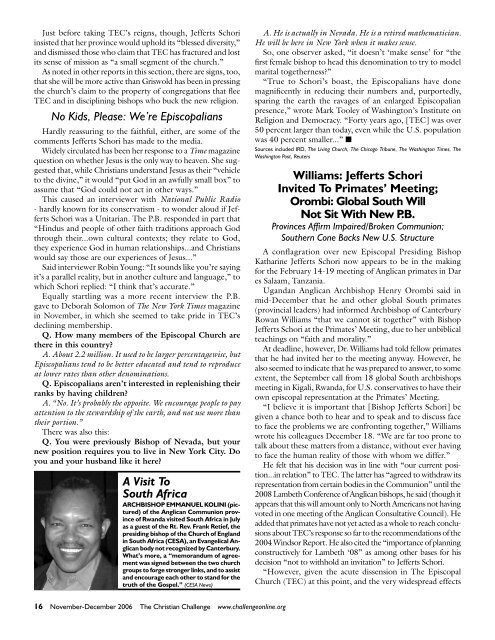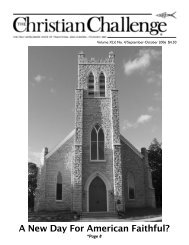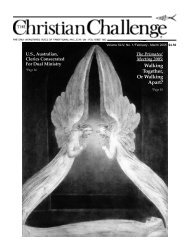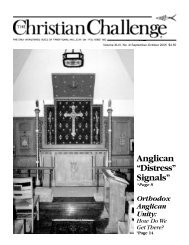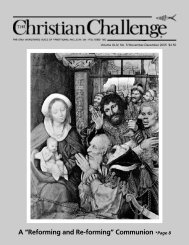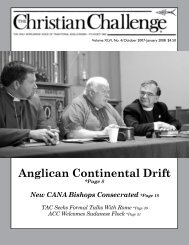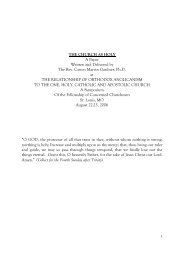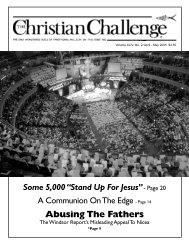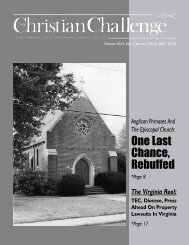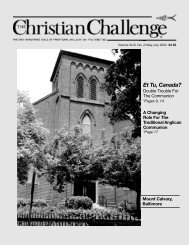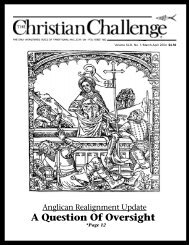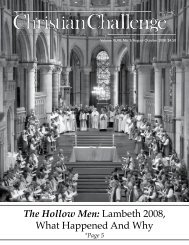Church Planting For The 21st Century - The Christian Challenge
Church Planting For The 21st Century - The Christian Challenge
Church Planting For The 21st Century - The Christian Challenge
You also want an ePaper? Increase the reach of your titles
YUMPU automatically turns print PDFs into web optimized ePapers that Google loves.
Just before taking TEC’s reigns, though, Jefferts Schori<br />
insisted that her province would uphold its “blessed diversity,”<br />
and dismissed those who claim that TEC has fractured and lost<br />
its sense of mission as “a small segment of the church.”<br />
As noted in other reports in this section, there are signs, too,<br />
that she will be more active than Griswold has been in pressing<br />
the church’s claim to the property of congregations that flee<br />
TEC and in disciplining bishops who buck the new religion.<br />
No Kids, Please: We’re Episcopalians<br />
Hardly reassuring to the faithful, either, are some of the<br />
comments Jefferts Schori has made to the media.<br />
Widely circulated has been her response to a Time magazine<br />
question on whether Jesus is the only way to heaven. She suggested<br />
that, while <strong>Christian</strong>s understand Jesus as their “vehicle<br />
to the divine,” it would “put God in an awfully small box” to<br />
assume that “God could not act in other ways.”<br />
This caused an interviewer with National Public Radio<br />
- hardly known for its conservatism - to wonder aloud if Jefferts<br />
Schori was a Unitarian. <strong>The</strong> P.B. responded in part that<br />
“Hindus and people of other faith traditions approach God<br />
through their...own cultural contexts; they relate to God,<br />
they experience God in human relationships...and <strong>Christian</strong>s<br />
would say those are our experiences of Jesus...”<br />
Said interviewer Robin Young: “It sounds like you’re saying<br />
it’s a parallel reality, but in another culture and language,” to<br />
which Schori replied: “I think that’s accurate.”<br />
Equally startling was a more recent interview the P.B.<br />
gave to Deborah Solomon of <strong>The</strong> New York Times magazine<br />
in November, in which she seemed to take pride in TEC’s<br />
declining membership.<br />
q. How many members of the Episcopal <strong>Church</strong> are<br />
there in this country?<br />
A. About 2.2 million. It used to be larger percentagewise, but<br />
Episcopalians tend to be better educated and tend to reproduce<br />
at lower rates than other denominations.<br />
q. Episcopalians aren’t interested in replenishing their<br />
ranks by having children?<br />
A. “No. It’s probably the opposite. We encourage people to pay<br />
attention to the stewardship of the earth, and not use more than<br />
their portion.”<br />
<strong>The</strong>re was also this:<br />
q. You were previously Bishop of Nevada, but your<br />
new position requires you to live in New York City. Do<br />
you and your husband like it here?<br />
A Visit To<br />
South Africa<br />
ARCHBISHOP EMMANUEL KOLINI (pictured)<br />
of the Anglican Communion province<br />
of Rwanda visited South Africa in July<br />
as a guest of the Rt. Rev. Frank Retief, the<br />
presiding bishop of the <strong>Church</strong> of England<br />
in South Africa (CESA), an Evangelical Anglican<br />
body not recognized by Canterbury.<br />
What’s more, a “memorandum of agreement<br />
was signed between the two church<br />
groups to forge stronger links, and to assist<br />
and encourage each other to stand for the<br />
truth of the Gospel.” (CESA News)<br />
16 November-December 2006 <strong>The</strong> <strong>Christian</strong> <strong>Challenge</strong> www.challengeonline.org<br />
A. He is actually in Nevada. He is a retired mathematician.<br />
He will be here in New York when it makes sense.<br />
So, one observer asked, “it doesn’t ‘make sense’ for “the<br />
first female bishop to head this denomination to try to model<br />
marital togetherness?”<br />
“True to Schori’s boast, the Episcopalians have done<br />
magnificently in reducing their numbers and, purportedly,<br />
sparing the earth the ravages of an enlarged Episcopalian<br />
presence,” wrote Mark Tooley of Washington’s Institute on<br />
Religion and Democracy. “<strong>For</strong>ty years ago, [TEC] was over<br />
50 percent larger than today, even while the U.S. population<br />
was 40 percent smaller...” n<br />
Sources included IRD, <strong>The</strong> Living <strong>Church</strong>, <strong>The</strong> Chicago Tribune, <strong>The</strong> Washington Times, <strong>The</strong><br />
Washington Post, Reuters<br />
Williams: Jefferts Schori<br />
Invited To Primates’ Meeting;<br />
Orombi: Global South Will<br />
Not Sit With New P.B.<br />
Provinces Affirm Impaired/Broken Communion;<br />
Southern Cone Backs New U.S. Structure<br />
A conflagration over new Episcopal Presiding Bishop<br />
katharine Jefferts Schori now appears to be in the making<br />
for the February 14-19 meeting of Anglican primates in Dar<br />
es Salaam, Tanzania.<br />
Ugandan Anglican Archbishop Henry Orombi said in<br />
mid-December that he and other global South primates<br />
(provincial leaders) had informed Archbishop of Canterbury<br />
Rowan Williams “that we cannot sit together” with Bishop<br />
Jefferts Schori at the Primates’ Meeting, due to her unbiblical<br />
teachings on “faith and morality.”<br />
At deadline, however, Dr. Williams had told fellow primates<br />
that he had invited her to the meeting anyway. However, he<br />
also seemed to indicate that he was prepared to answer, to some<br />
extent, the September call from 18 global South archbishops<br />
meeting in kigali, Rwanda, for U.S. conservatives to have their<br />
own episcopal representation at the Primates’ Meeting.<br />
“I believe it is important that [Bishop Jefferts Schori] be<br />
given a chance both to hear and to speak and to discuss face<br />
to face the problems we are confronting together,” Williams<br />
wrote his colleagues December 18. “We are far too prone to<br />
talk about these matters from a distance, without ever having<br />
to face the human reality of those with whom we differ.”<br />
He felt that his decision was in line with “our current position...in<br />
relation” to TEC. <strong>The</strong> latter has “agreed to withdraw its<br />
representation from certain bodies in the Communion” until the<br />
2008 Lambeth Conference of Anglican bishops, he said (though it<br />
appears that this will amount only to North Americans not having<br />
voted in one meeting of the Anglican Consultative Council). He<br />
added that primates have not yet acted as a whole to reach conclusions<br />
about TEC’s response so far to the recommendations of the<br />
2004 Windsor Report. He also cited the “importance of planning<br />
constructively for Lambeth ‘08” as among other bases for his<br />
decision “not to withhold an invitation” to Jefferts Schori.<br />
“However, given the acute dissension in <strong>The</strong> Episcopal<br />
<strong>Church</strong> (TEC) at this point, and the very widespread effects


